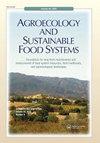An analytical framework to measure the social return of community-supported agriculture
IF 2.6
3区 农林科学
Q1 AGRICULTURE, MULTIDISCIPLINARY
引用次数: 0
Abstract
ABSTRACT The lack of objective sustainability indicators and measurements leaves the performance of agricultural systems under-valued, limiting the possibility of communicating any evidence about promoting economic, social, and environmental values to food system stakeholders. In this study, a cost-benefit analysis based on the social return on investment (SROI) was designed and applied to five community-supported agriculture (CSA) initiatives. CSA are local food supply chains that have become popular in recent years, characterized by features such as member volunteer commitment, reduction of synthetic inputs in food production, and shortening of the supply chain to reduce costs and environmental impact. Social and environmental outcomes related to the wider spread of impacts were comprehensively assessed in the study. A participatory assessment with CSA representatives resulted in the incorporation of several ecosystem service (ES) indicators identified from the literature. Findings revealed that the case studies analyzed are characterized by a limited but positive socio-environmental performance compared to conventional food supply chains, thereby demonstrating that they can create real value in terms of social gains and mitigation of environmental impacts.衡量社区支持农业社会回报的分析框架
摘要:由于缺乏客观的可持续性指标和衡量标准,农业系统的绩效被低估,限制了向粮食系统利益相关者传达任何关于促进经济、社会和环境价值的证据的可能性。在本研究中,设计了一个基于社会投资回报率(SROI)的成本效益分析,并将其应用于五个社区支持农业(CSA)倡议。CSA是近年来流行的当地食品供应链,其特点是成员志愿者承诺、减少食品生产中的合成投入以及缩短供应链以降低成本和环境影响。该研究全面评估了与更广泛影响相关的社会和环境结果。CSA代表的参与性评估纳入了文献中确定的几个生态系统服务指标。调查结果显示,与传统食品供应链相比,所分析的案例研究的特点是有限但积极的社会环境表现,从而表明它们可以在社会收益和减轻环境影响方面创造真正的价值。
本文章由计算机程序翻译,如有差异,请以英文原文为准。
求助全文
约1分钟内获得全文
求助全文
来源期刊

Agroecology and Sustainable Food Systems
AGRICULTURE, MULTIDISCIPLINARY-GREEN & SUSTAINABLE SCIENCE & TECHNOLOGY
CiteScore
4.80
自引率
7.70%
发文量
73
期刊介绍:
Agroecology and Sustainable Food Systems is devoted to the rapidly emerging fields of agroecology and food system sustainability. By linking scientific inquiry and productive practice with transformative social action, agroecology provides a foundation for developing the alternative food systems of the future. The journal focuses on the changes that need to occur in the design and management of our food systems in order to balance natural resource use and environmental protection with the needs of production, economic viability, food security, and the social well-being of all people.
Agroecology and Sustainable Food Systems examines our current food systems from production to consumption, and the urgent need to transition to long-term sustainability. The journal promotes the study and application of agroecology for developing alternatives to the complex problems of resource depletion, environmental degradation, a narrowing of agrobiodiversity, continued world hunger, consolidation and industrialization of the food system, climate change, and the loss of farm land. The journal uses a food systems approach, and seeks experiences in agroecology that are on-farm, participatory, change-oriented, and backed by broad-based methodologies of sustainability analysis and evaluation.
 求助内容:
求助内容: 应助结果提醒方式:
应助结果提醒方式:


